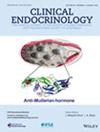Thyrotropin-secreting adenoma (TSHoma) is a rare type of pituitary adenoma, occurring in one per million people. Little is known about TSHoma. We summarized the demographic, clinical and hormonal characteristics of TSHoma based on a single-centre experience. Moreover, we explored the predictive value of postoperative thyroid function for long-term remission.
We retrospectively analysed 63 patients who were diagnosed as TSHoma and surgically treated at our hospital from January 2015 to June 2021. The preoperative clinical characteristics were analysed and compared between remission and nonremission groups. Thyroid function was measured at 1 day, 1 month, 3 months, 6 months, 12 months and over 12 months after surgery to determine whether they could predict long-term remission.
The male to female ratio for TSHoma was 1.25. The mean age at diagnosis was 45 ± 12 years. Clinical presentation was varied, presenting with hyperthyroidism (68.25%), space-occupying effect (15.87%), amenorrhea (7.14% of female patients) and nonsymptoms (22.22%). 88.14% of patients achieved postoperative endocrinological remission. Larger tumour size and tumour invasion into cavernous sinus and suprasellar with chiasmal compression were strong predictors of lower rates of endocrinological remission. Postoperative thyroid function at 3 months was a viable diagnostic predictor for postoperative remission, especially for FT4 level with a 20.65 pmol/L cutoff.
Tumour size and extent are major prognostic factors for remission. Postoperative thyroid function at 3 months could be used as a clinical prediction tool for long-term endocrinological remission.


